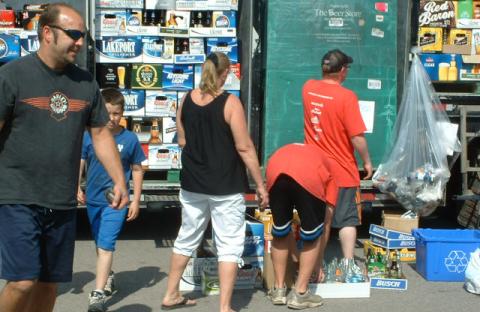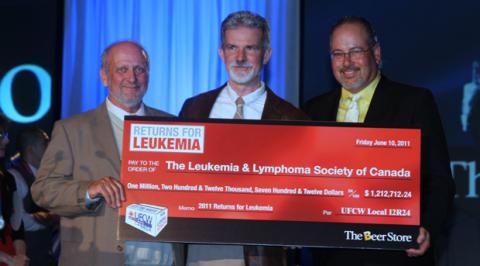
Unions aren't just looking out for its members; in the case of United Food and Commercial Workers Canada, whose 250,000 members make it the largest private-sector union for Canada's retail and service industries, it has almost raised $25 million for the Leukemia and Lymphoma Society of Canada (LLSC).
UFCW Canada adopted the LLSC as its charity of choice in 1985. Since then, it has donated $23.8 million for research on blood cancers, such as leukemia and Hodgkin's disease, with hopes of finding a cure. This summer, after the tally from its latest fundraising efforts, it will have reached $25 mil.
One of its easiest fundraising drives is coming up this weekend in Ontario, May 26 and 27 -- the Returns for Leukemia bottle drive, which simply asks customers to donate all or a portion of their empty bottles (or cash) with 100 percent of the proceeds going to the LLSC.
UFCW Canada Local 12R24, which represents more than 6,000 Beer Store employees, organizes the fundraiser each May. However, the initial idea a decade ago took some convincing, recalls union president Rob Edwards.
"There was probably a half a dozen people sitting around dreaming - some were union officials and some were company officials - just kind of brainstorming," Edwards tells Samaritanmag.
"Frankly, probably four of the six thought it was ludicrous to even have a goal. I mean, at that time we talked about the possibility of [raising] $250,000. I guess the four of the six of us thought that was outlandish and almost bordering on lunacy. But, here we are down the road."
The total sum from the last two bottle drives crossed the $1 million mark. 2,800 Ontario union members and ouside volunteers gave their time to help with last year's drive.
UFCW Canada also hosts other fundraisers year-round across Canada for the LLSC from marathons and hockey tournaments to barbecues and bake sales.
"Every local in UFCW Canada is involved in [fundraising in] one way, shape or another," Edwards says. "I just truly believe that not only trade unions, but large groups of employees should do something to give back to the community.
"When people jump in for whatever amount of time, whether it be a couple of hours or a whole weekend for the bottle drive, they have that sense of a rewarding feeling and then they come back reinvigorated [next year] with more ideas."
He says that a "staggering" number of events benefitting the LLSC have been planned or are being organized with the Beer Store this summer, such as movie nights, charity concerts and golf tournaments.

Local 12R24 recently gave an award to Toronto's Dr. Dwayne Barber for his work with adult T-cell acute lymphoblastic leukemia (TALL). Funds raised by the union workers have helped Barber's research lab to figure out what triggers the blood cancer to ensure that new therapies are discovered, says LLSC's senior national director Lorna Warwick.
"Right now, the survival rate for that kind of leukemia in adults is that only 40 percent survive five years," Warwick tells samaritanmag. "We know that within the genes, there are certain pathways that kind of signal the cancer to happen, so it turns on the cancer. And he did an investigation into those global pathways to figure out how to turn them off."
Another project in the works at the LLSC is its Therapy Acceleration Program (TAP), which funds promising drugs from small biomedical companies to get them into clinical trials at a faster rate. The LLSC wants to ensure that new treatments get to patients as soon as possible.
One new drug, for instance, could significantly improve the survival rates of adults with acute myeloid leukemia (AML), a type of cancer that is hard to treat effectively. The drug, CPX-351 liposome injection, has been through two phases of clinical trials - and has been far more successful than other kinds of treatments.
"With normal therapy, the five-year survival rate is only around 22 percent and with this drug [patients] have a survival rate of around 50 percent," says Warwick. "It's still not where we would like it to be, but it's a big improvement."
FASHION NEWS